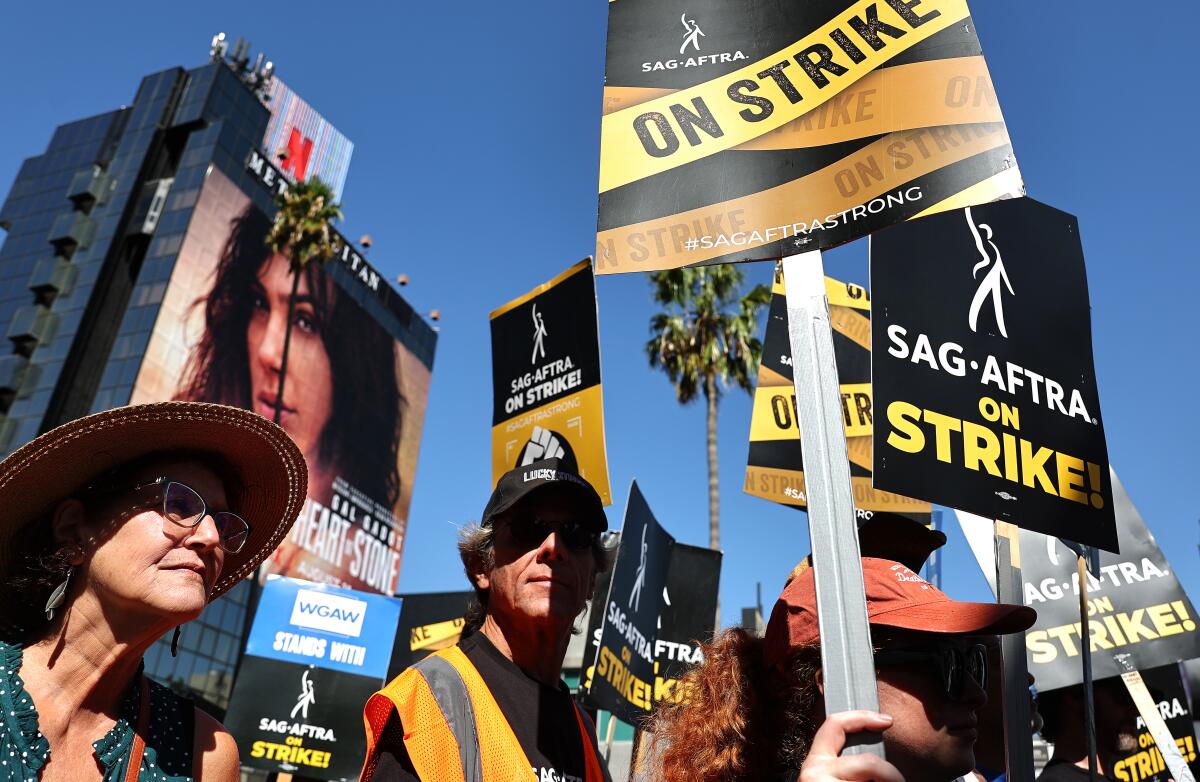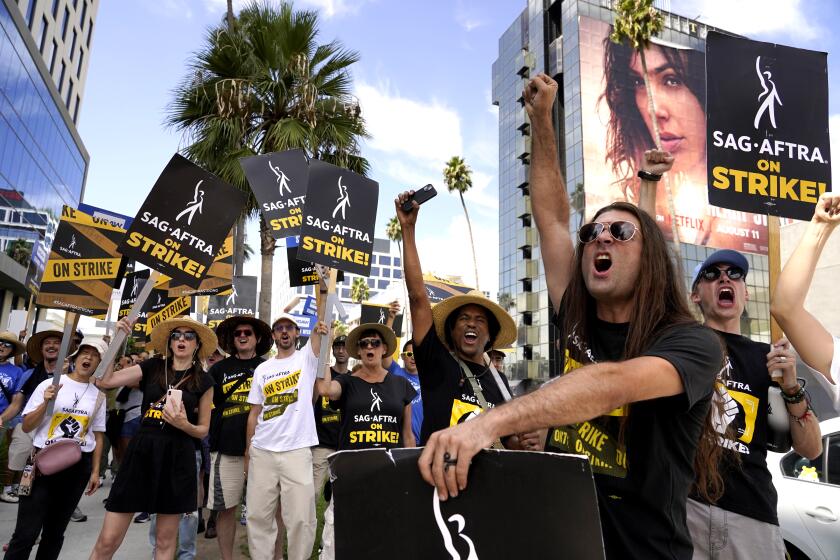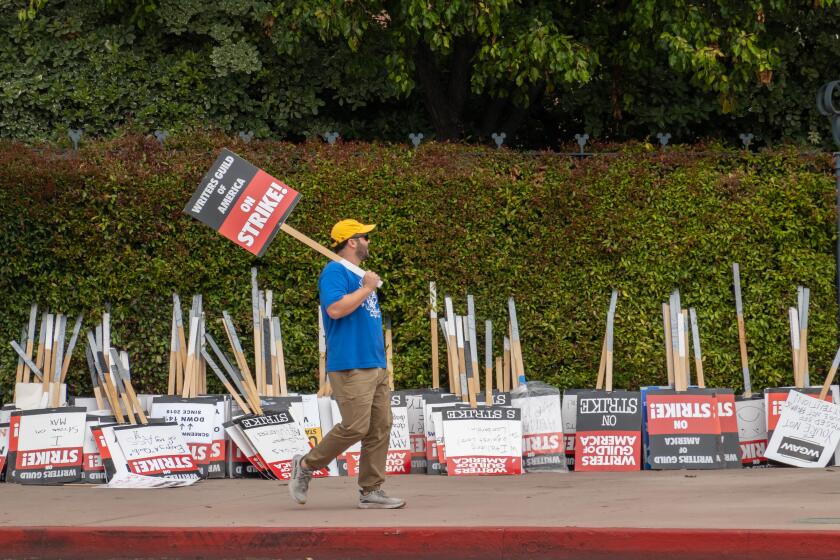Hollywood studios are already proving they learned nothing from the writers’ strike

- Share via
Welp, they did it again.
After months of self-righteous declarations about wanting to end the 100-day-long actors’ strike and get Hollywood, and all of the industries that support it, back to work, the Alliance of Motion Picture and Television Producers has walked away from the negotiating table once more.
Negotiating members of the Screen Actors Guild-American Federation of Television and Radio artists claimed to be shocked by an AMPTP-inflicted breakdown in talks, and perhaps they were. But they shouldn’t have been. For the trade organization, whose sole purpose is to represent the studios in contract negotiations with Hollywood unions, this is the favored move.

Subscribers get exclusive access to this story
We’re offering L.A. Times subscribers special access to our best journalism. Thank you for your support.
Explore more Subscriber Exclusive content.
If they can’t control the conversation, they just pick up their marbles and go home. Where they will stay for as long as they feel like it.
And why not? Studio heads, including Walt Disney Co. Chief Executive Bob Iger, Netflix co-CEO Ted Sarandos, Warner Bros. Discovery CEO David Zaslav and NBCUniversal Studio Group Chairman Donna Langley, who joined the recent talks, may be concerned about how a continued strike will affect their shareholders and upcoming quarterly reports, but unlike the 160,000 SAG-AFTRA members, and the hundreds of thousands of other workers impacted by the strike, they’re still getting (very large) paychecks.
The actors, who resume talks with the studios on Monday, shouldn’t rush a deal because Hollywood is impatient to work. Not with existential issues like AI on the table.
This is how the studios behaved for the 148-day writers’ strike before agreeing to a contract that easily could have been offered to the Writers Guild of America at any point in the negotiations, including the day before the strike began.
And just as they did when negotiations with the writers broke down, the AMPTP has gone public with its grievances, blaming the actors for making unreasonable demands, including a system of residual payments that Sarandos was quick to characterize as “a levy” on Netflix subscribers.
(In case you were wondering who to blame when your streaming subscription rate goes up. Which it most definitely would have done, and will continue to, even if SAG had accepted the AMPTP’s initial offer in June.)
The AMPTP’s decision to air its ire is proving to be just as counterproductive as it was when the alliance did so during the WGA negotiations. On Friday, the Hollywood unions, including the WGA and IATSE, called on the AMPTP to return to the table, and 2,000 producers have signed a petition calling for the organization to lose the final “P,” arguing that it is negotiating on behalf of companies and conglomerates while actual producers are caught in the crossfire.
It’s easy to understand why Sarandos and his AMPTP colleagues are incensed, though far less easy to justify. The streaming business was built, in large part, on the ability to acquire, and air, enormous quantities of series and movies without paying the kind of residuals to actors and writers that traditional broadcast and cable platforms did.
Nice work if you can get it.
And, in all the excitement of the binge model and peak TV, they got quite a lot of it. For more than a decade, the studios managed to fend off this core economic problem with a series of deflections, beginning with “We don’t know exactly how this is going to work,” then moving to “But don’t you love reaching new audiences?” before settling on “Well, this is how the business is run now and we can’t afford to change it.”
Honestly, you have to admire the commitment to the con even as you tear out your hair over its greedy absurdity.
You can believe in the magic of Hollywood while understanding that it is not literally magic — people on every level expect to make a living doing whatever job they do in the entertainment industry. Including, you know, actors.
Streaming services created a loophole — hey, we’re just experimenting over here — and now they want to make that loophole the law.
Even contracts that win over the most skeptical writers and actors won’t be able to fix some of the biggest fractures facing the industry today.
The problem is that the people who actually make the things that streaming platforms sell are tired of not being paid in a manner that allows them to keep doing it. And as streaming increasingly resembles broadcast television — with weekly episodes and advertising — now is precisely the time for it to pony up on residuals.
If the streamers think it’s too “expensive,” they should just be happy SAG isn’t asking for back pay — now that would be expensive.
Sign up for This Evening's Big Stories
Catch up on the day with the 7 biggest L.A. Times stories in your inbox every weekday evening.
You may occasionally receive promotional content from the Los Angeles Times.
The AMPTP is refusing to accept that the “experimental” phase of streaming is over. But it has been over for years. If the studios, including and especially Netflix, had created a working residual system for streaming from the get-go, the explosion of what they so lovingly refer to as “content” would no doubt have been less dramatic. But it would have been more fiscally manageable, and we would not be in the midst of a financially devastating five-month-and-counting work stoppage.
Which the AMPTP seems intent on prolonging with its pattern of “I’m done talking about this” hissy fits.
You don’t get to say “We’re doing everything we can to get people back to work” and then just walk away when the mood strikes you. The studios created every problem they now face; it’s their responsibility to get back in that room and clean up their own mess.
More to Read
Sign up for This Evening's Big Stories
Catch up on the day with the 7 biggest L.A. Times stories in your inbox every weekday evening.
You may occasionally receive promotional content from the Los Angeles Times.













